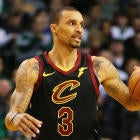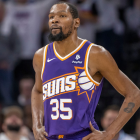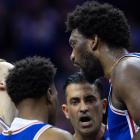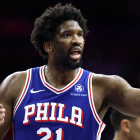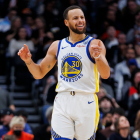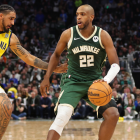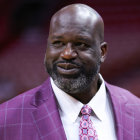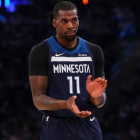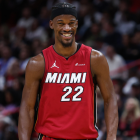When the Kyrie Irving trade sent the NBA into an unusual August frenzy, the Cleveland Cavaliers were widely praised. In the face of an uncomfortable challenge -- trading a 25-year-old star who made it known he wanted out -- their front office looked resourceful and shrewd. Many of the plaudits focused on Cleveland's acquisition of Jae Crowder, the versatile forward who had finished 20th in the league in real-plus minus last season.
Crowder seemed like a perfect fit. The Cavs needed someone who could help their small lineups succeed, and he was coming off the best 3-point shooting season of his career with the Boston Celtics. As much as it hurt to trade Irving, Cleveland looked like a more balanced team because of Crowder's presence alone.
In retrospect, that analysis missed the mark by a mile.
Cleveland traded Crowder to the Utah Jazz as part of its summer makeover last Thursday. Once again, general manager Koby Altman is being commended for his creativity -- on paper, the new-look Cavs appear much stronger, and their first game was extremely encouraging.
George Hill, in particular, has been singled out as a difference-maker. He can do all the things a LeBron James team needs from its point guard, and he gives Cleveland a better perimeter defender at the position than it has had in eons. It's worth noting, though, that everybody lauded the Sacramento Kings for acquiring him, too, and that didn't work out at all.
What have we learned from the four-ish months that Crowder spent with the Cavs and Hill spent with the Kings? Will their new situations bring out the best in them? Let's try this again.

In 53 games, Crowder shot just 32.8 percent from 3-point range for Cleveland. Rather than continuing to be a plus-minus star, the Cavs did worse on both ends with him on the court. He never found his place, and it was his worst season in years.
The easiest explanation for this is that he simply did not fit. While he has adaptable skills, he is a system player -- and Cleveland is not really a system team. James controls the game and manipulates defenders as well as anybody in NBA history, so the Cavs don't need a fancy, equal-opportunity offense.
When Cleveland had the ball, Crowder's job was essentially to stand around and space the floor. He often went several possessions without touching the ball, and this made it difficult for him to get in rhythm when he did get opportunities to shoot. His best offensive qualities were hidden, and while he has long been a dogged, heady defender, he is not the kind of player who can make up for multiple teammates' mistakes. The Cavs were so miserable on that end that Crowder couldn't stand out.
It has taken only two games with the Jazz for the Cleveland disappointment to wear off and the optimism of the summer to return. Crowder is now playing in an aggressive defensive system and an offense that features hardly any isolation play, instead emphasizing ball movement, screening and timing.
In Utah, Crowder can switch with the likes of Ricky Rubio, Joe Ingles and Donovan Mitchell on the perimeter while Rudy Gobert patrols the paint. He is reunited with Jonas Jerebko, who called him "one of my all-time favorite teammates" last Friday (and for good reason: the Crowder-Jerebko combination had net ratings of 14.1, 12.2 and 16.5 in the past three seasons). It is early, but he appears to be loving life.
"Unbelievable," Crowder said to Jazz sideline reporter Kristen Kenney after his debut. "These guys have welcomed me since I walked through the door. Playing on the court with them is very, very, very fun, man. I got back to having fun playing basketball with a great group of guys.
"We're playing free. Coach gives a lot of freedom to these guys -- some structure, but a lot of freedom -- and I love it. I love playing within a system."
No longer is Crowder running up and down the court and waiting ages to just to touch the ball. No longer is he languishing on a team with chemistry issues, high expectations and too many players who pound the ball. He is involved on every play, and he is helping Utah in precisely the way he was supposed to help Cleveland: he brings floor spacing, toughness and energy without taking anything off the table. The Jazz have won 10 games in a row, and Crowder could end up being the piece that vaults them into the playoffs.

Hill, like Crowder, is known primarily as a 3-and-D guy. He has been a high-level role player throughout his career and, at his best, he looks like a fringe star. He does not need the ball in his hands to help an offense, as he is an excellent spot-up shooter, and he is the kind of defender who can annoy stars one-on-one and play disciplined team defense.
In Utah last season, Hill played the most efficient -- and arguably best -- basketball of his life. A a toe injury, however, limited his availability. The Kings seemed smart for signing him (and veterans Zach Randolph and Vince Carter) -- this was a team that could use someone to stabilize their offense and show the young players how to be professionals.
The idea was for Sacramento to start laying a foundation for the future. Hill could play with young guards De'Aaron Fox and Buddy Hield, and ideally he would make them both better. At the introductory press conference for the three vets, there was a lot of talk about building a winning culture.
Kings executive VP Scott Perry left to become the general manager of the New York Knicks days after that press conference, and when the team started the season 1-8, it was clear that the team was not going to compete for a playoff spot. In December, the Salt Lake Tribune's Tony Jones reported that Perry had initially promised Hill, Randolph and Carter that Sacramento would be competitive.
"Very frustrating," Hill told the Sacramento Bee's Ailene Voisin in January. "I've never been through anything like this, not ever. It's not what I expected, a little more difficult than I anticipated."
Hill is not above criticism for his 36-game stint with the Kings. He shot efficiently, but was passive with the ball, didn't display his usual defensive intensity and was clearly bothered by all the losing. But while Sacramento will not miss him, the Cavs have not acquired damaged goods. He had a pep in his step in his first game in Cleveland, and he told reporters that his toe is not bothering him at all.
Just as important, Hill's role isn't too different from when he played for the Paul George-led Indiana Pacers. The hope is that, unlike Crowder, he will be comfortable with the Cavs.
"We have one of the best players in the history of the game, I'm sure he's going to dictate the tempo and things like that." Hill said at his first Cavs practice. "We just got to do our job, be the best role players we can possibly be. He's the Batman, and we got to be all Robins."
For the Robins, defense will be an enormous part of the job. Cleveland was 29th in the league in defensive rating before the trade deadline, and it needs to be connected on that end by the time the playoffs arrive. Hill is an enormous upgrade in this area, and unlike Crowder, he should not find himself dismayed by his teammates' mistakes on a regular basis. The composition of the team is totally different now, and that in itself gives Hill a chance to show he is still a winning player. If the Cavs are going to reclaim their spot as the East's dominant force, they need him to do so.













